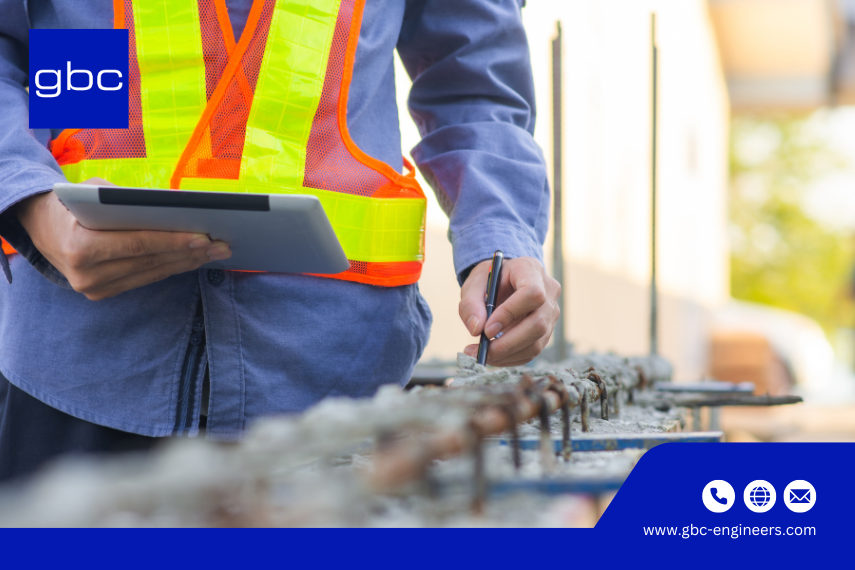For businesses operating in construction, real estate, facility management, or industrial sectors, structural engineer inspections are critical not just for compliance, but for business continuity, asset protection, and long-term operational success. A professional inspection conducted by licensed structural engineers offers far more than a regulatory tick-box; it delivers strategic insights that mitigate risk, control costs, and ensure safety.
Discover the essential components of a structural engineer inspection with gbc engineers. Learn what engineers evaluate to ensure building safety, stability, and long-term performance.
What Is a Structural Engineer Inspection?
A structural engineer inspection is a comprehensive evaluation conducted by licensed professionals who specialize in identifying, analyzing, and reporting on the physical integrity and performance of structural elements. These inspections focus on load-bearing materials, with particular attention to issues like cracking, corrosion, spalling, deflection, deformation, and code compliance.
While general building inspections may provide surface-level overviews, structural inspections dig deep into the actual framework—evaluating concrete and steel elements for signs of weakness, damage, or potential failure.
Read More: Why Data Center Temperature Monitoring Is Critical for Uptime - gbc engineers
Why Structural Engineer Inspections Are Essential for Businesses
Safeguarding Structural Integrity and Assets
A structural engineer inspection identifies vulnerabilities in load-bearing elements, foundation systems, and other key structural components. This proactive approach helps avoid structural degradation that can threaten business operations and increase insurance liabilities. For commercial buildings, warehouses, manufacturing plants, and office complexes, structural integrity directly impacts safety and productivity.
Preventing Business Downtime and Liability
Failure to detect and remediate structural issues can result in costly repairs, tenant disputes, building evacuation, or even legal consequences. A professional structural engineer inspection helps B2B stakeholders uncover hidden damage early and implement cost-effective solutions. This is especially critical during new construction, property design updates, or basement renovations.
Whether you're planning to start structural work, reviewing a change of use, or managing high-traffic assets, a thorough inspection ensures safety and compliance. To understand the full process, contact your local NE-based structural experts today for pricing and inspection details tailored to your project.
Compliance With Building Codes and Industry Regulations
Commercial buildings must meet local, regional, and international codes, including seismic, fire resistance, and load-bearing standards. A structural engineer ensures that your property remains code-compliant through regular audits and assessments. This supports risk management, eases insurance claims, and protects your investment from legal exposure.
Enhancing Real Estate Value and Negotiation Power
Whether acquiring, leasing, or managing a commercial property, a structural engineer inspection can serve as an independent, expert-backed valuation tool. The inspection report can identify needed upgrades or confirm structural soundness, strengthening your position in lease negotiations, asset acquisitions, or divestitures.
Read More: Top Methods for Efficient Server Rack Cooling - gbc engineers
Structural Inspections for Commercial Properties
Commercial buildings often have more complex structural demands than residential structures due to larger footprints, heavier structural demands, and more intensive usage. A structural engineer inspection in a commercial setting involves:
- Assessment of High-Stress Zones: Warehouses, production floors, and multi-tenant buildings require detailed analysis of weight-bearing capacity.
- Review of Structural Redundancy: Ensuring the structure has backup strength under stress or during emergencies.
- Evaluation of Material Fatigue: Especially for buildings that endure frequent mechanical vibration or temperature changes.
A professional inspection helps maintain compliance, reduce liabilities, and avoid disruptions that could impact business operations.

Key Components of a Structural Engineer Inspection
Foundation Assessment
The foundation is the critical support element for any commercial or industrial building. Engineers examine:
- Soil type and bearing capacity
- Settlement or heaving due to moisture or erosion
- Foundation cracks (vertical, horizontal, stair-step)
- Slab displacement or bowing
- Piling or pier condition (for deep foundations)
Advanced techniques like ground-penetrating radar (GPR), thermal scanning, or soil resistivity tests may be used for deep or complex foundations. Businesses with heavy machinery, large storage racks, or multi-story construction especially benefit from routine foundation evaluations.
Read More: How to Reduce Data Center Power Consumption Effectively - gbc engineers
Structural Integrity of Load-Bearing Elements
Key weight-supporting components such as steel columns, reinforced concrete beams, and masonry walls must be checked for:
- Buckling, deflection, or fatigue
- Corrosion of rebar or steel
- Water intrusion or chemical damage (common in industrial zones)
- Cracks near reentrant corners or slab joints
- Disrupted force-transfer paths from previous renovations or modifications
This inspection ensures your building complies with current structural codes and can support expected structural demands, especially critical in commercial warehousing or heavy-duty manufacturing environments.
Roof and Framing Systems
Roofs are often one of the most vulnerable areas, especially in areas with snow load, high wind, or heavy HVAC installations. Inspections cover:
- Joists, rafters, trusses, and girders
- Structural deck condition (steel, concrete, or wood)
- Drainage system support (including ponding water risk)
- Anchorage of rooftop equipment (especially on data centers or telecom buildings)
- Fire damage or insulation degradation
For large buildings like warehouses or event halls, engineers check for lateral stability and deflection tolerance under load.
Building Envelope Evaluation
The building envelope plays a structural and environmental role. Engineers check:
- Curtain wall systems or precast panels for anchoring issues
- Window lintels, ledges, and expansion joints
- Cladding and façade fixings
- Penetration seals for piping and ductwork
- Evidence of differential movement between structural and non-structural components
A secure envelope protects from air, moisture, and pest intrusion while preventing structural degradation.
Floor System Load and Settlement Review
Commercial floor slabs support large dynamic forces. The inspection includes:
- Concrete slab-on-grade cracking and joint separation
- Vibration under operational stress (especially for mezzanines or offices over warehouses)
- Floor deflection and structural performance test results
- Performance under rolling or vibrating equipment movement (pallet jacks, lifts, machinery)
- Properly performing floor systems are vital in logistics centers, laboratories, and production plants.

Seismic, Wind, and Environmental Stress Analysis
Depending on location, engineers assess:
- Wind bracing system effectiveness (shear walls, cross bracing, moment frames)
- Seismic force distribution and retrofitting status
- Thermal expansion and contraction joints
- Frost heave and flood resistance
- Combined structural demands due to weather extremes
Buildings in high-risk zones require reinforced structural systems to protect against environmental stress.
Code Compliance and Safety Systems Review
The engineer cross-checks your structure’s condition against:
- IBC (International Building Code), local codes, and safety standards
Fireproofing and rated assemblies
- Egress routes and structural barriers
- Equipment anchorage and accessibility regulations
Compliance protects both your employees and your organization from nonconformance penalties.
Structural Inspection Report and Recommendations
The structural engineer compiles a detailed report including:
- Visual documentation of issues
- Measurements and diagrams
- Severity assessments (minor, moderate, major)
- Immediate and long-term recommendations
- Repair or retrofit priorities
For commercial clients, reports can be formatted to support:
- Capex planning
- Lease negotiations
- Insurance evaluations
- Project management integration
Concrete Structural Elements Inspection
- Visual Survey: Engineers begin by looking for visible damage such as cracking, scaling, discoloration, and deflection.
- Crack Mapping & Analysis: Cracks are mapped and analyzed to determine whether they are surface-level or deep structural issues.
- Spalling and Delamination: Engineers examine areas where concrete has flaked or peeled off, which could indicate internal corrosion.
- Carbonation & Chloride Tests: These chemical tests assess the risk of corrosion by evaluating pH levels and salt content near the reinforcement.
- Rebar Exposure & Corrosion: Engineers may use half-cell potential testing and cover meters to assess the condition of embedded reinforcement.
Steel Structural Elements Inspection
- Weld and Bolt Checks: Inspectors examine the condition and performance of welded and bolted joints for signs of fatigue or failure.
- Corrosion Assessment: Surface rust, pitting, and section loss are documented. In marine or humid environments, accelerated corrosion is a major concern.
- Load Testing and Deformation: Structural engineers may perform load simulations or use laser scanning to detect deformation, warping, or displacement.
- Coating and Fireproofing Condition: Paints, primers, and fireproof coatings are assessed for coverage, adhesion, and material degradation.
Read More: Data Center Network Architecture for Scalability and Performance - gbc engineers
When Should Businesses Schedule Structural Inspections?
- Prior to Property Acquisition or Sale
- Before Leasing or Subletting Industrial Space
- Following Natural Disasters (earthquake, flood, storm)
- Before Renovation, Expansion, or Change of Use
- At Set Intervals for High-Risk Facilities (e.g., annually for factories, bi-annually for data centers)
- Post-construction as part of QA/QC
Proactive inspections maintain structural health and minimize costly surprises.
Read More: How to Build a Smart Data Center Maintenance Strategy - gbc engineers
Why Partner with gbc engineers?
gbc engineers is a structural engineering company that offers a unique combination of international experience, state-of-the-art digital tools (including BIM), and on-site expertise to deliver actionable insights into your building’s stability and performance. Whether you're expanding a warehouse in Germany, building a factory in Cambodia, or retrofitting an office in Berlin, our structural engineers:
- Understand global and local codes
- Provide clear, comprehensive inspection reports
- Recommend cost-effective, practical solutions
- Support your long-term safety, compliance, and operational goals
To learn more about our structural engineer inspection services, contact our team for a customized proposal and competitive price based on your project scope and location.
Ready to Future-Proof Your Data Center?
Partner with gbc engineers to design a facility that delivers performance, reliability, and long-term value.
🌐 Visit: www.gbc-engineers.com
🏗️ Explore Our Services: Services - gbc engineers
Conclusion
A structural engineer inspection is essential for anyone serious about property safety, value, and compliance. It uncovers hidden flaws, prevents future problems, and provides actionable insights that standard inspections cannot match.
At gbc engineers, we offer industry-leading structural inspection services backed by years of expertise in residential, commercial, and industrial construction. Whether you're a property owner, buyer, or investor, our comprehensive assessments provide the clarity and confidence you need to make informed decisions.